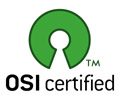Open Systems
|
Integrated Imaging proudly supports the Open Systems movement. Many individuals and organisations who have become alarmed by the corporatisation and ownership of knowledge, now release all or part of their creative output to be used freely by anyone. There are now many legal instruments (often licences) which prevent others taking and selling these works. The licence agreement, for example, might allow for a modest handling fee for the further distribution of these works, but any subsequent use or further redistribution would be free. Most of these agreements allow, and actually encourage, the enhancement of the work. In this way the works become collaborative works and many projects have thousands of contributors.
The most compelling argument for the Open Source movement is its very visibility. Every aspect is open to scrutiny and improvement. Linux is a now famous example of an open source development with a developer/contributor community numbering in the hundreds of thousands. |
 
|
||
|
|
||
| Copyleft
What were the origins of the Open Systems movement? Well, this is the delicious irony of it - Open Systems owe much of their success to contributions from commercial market leading companies in their push to popularise products. For an organisation to advertise a term like "industry standard", it needed to be part of a standardisation group or committee. Most often, these standardisation groups arose out of the user community, and largest user communities are governments.
The story of HTML, the language which underpins the internet, serves as an excellent example of an open standard collaboratively developed by users and corporations. From Wikipedia...
|
 The Copyleft Logo |
||
|
Governments around the world pour billions into their education systems in the belief that in will have positive social, cultural and economic benefits. An ideological struggle has emerged between those who believe in a concept of the "common good" and those who believe in the protection of ownership. As governments around the world evaluate the "return on investment" of their education expenditure, a common picture has emerged - the costs are outstripping the benefits. Some argue that we, as taxpayers and consumers, are paying more than we should. Few would argue that original ideas shouldn't be rewarded, but not indefinitely. Imagine paying every inventor and authour for every increment in human knowledge for all of recorded history; that's why patents and copyright expires after a time. Corporations, governments and businesses benefit from the expenditure on education through research and the availibility of trained and productive personnel. We, through government, benefit from the tax collected on the profits of business and the tax on incomes. In a fair system, this should work well, however we believe that some organisations have unfairly labelled the re-use of expired rights as new ideas. Open Source, Free and Open Source and other collaboratively built works attempt to make the tools of education and further development more accessible, and certainly at a lower cost. Not surprisingly, this text is not copyright, we simply ask you to acknowledge its origin. - Integrated Imaging Pty Ltd
|





